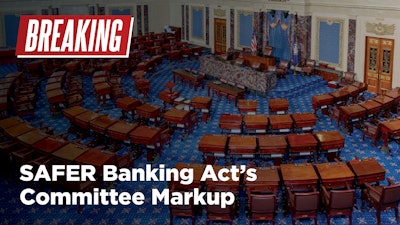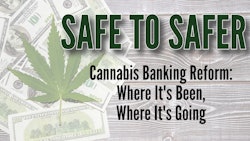
This article was updated Sept. 29.
A significant barrier for the cannabis industry is one step closer to being removed following the SAFER Banking Act’s advancement out of the Senate Banking Committee during a markup hearing Sept. 27.
After considering amendments related to federal regulatory powers over financial institutions, restorative justice, and the federal illegality of cannabis, among other proposals, the committee members voted, 14-9, to approve the cannabis banking bill.
The legislation, the Secure and Fair Enforcement Regulation (SAFER) Banking Act, aims to bring traditional opportunities and transparency to state-licensed cannabis businesses by offering safe harbor to financial institutions wishing to provide services to the industry.
This marks the first time cannabis banking reform has made meaningful headway in the Senate, despite related reform (the SAFE Banking Act) passing seven times in the U.S. House since 2019. The word “regulation” was added to the title of revised legislation introduced Sept. 20 as the SAFER Banking Act (S. 2860), which is the bill that’s now on a pathway forward after nearly four months of bipartisan negotiations in the Senate.
“Cannabis policies look different in different states, but legal cannabis small businesses and their employees are running into many of the same issues,” Senate Banking Committee Chairman Sherrod Brown, D-Ohio, said at the outset of the markup. “One of these issues is access to financial services. Regardless of how you feel about states’ efforts to legalize marijuana—I’ll say it again—regardless about how you feel about states’ efforts to legalize marijuana, this bipartisan bill is necessary. It will make it safer for legal cannabis businesses and service providers to operate, to protect their workers first and foremost, and to operate in their communities.”
Sen. Steve Daines, R-Mont., echoed Brown’s statement that the SAFER Banking Act is primarily about safety.
“First and foremost, the current all-cash model of legal cannabis businesses makes them targets for theft, for tax evasion and for organized crime,” Daines said. “The key to addressing this risk is by ensuring that all legal businesses have access to the banking system. Additionally, this bill tackles much-needed reforms with respect to financial account closures.”
With the legislation referred to only the Banking Committee in the Senate, the SAFER Banking Act now appears to be in the hands of Senate Majority Leader Chuck Schumer, D-N.Y., a co-sponsor who vowed Sept. 20 to bring it to a full floor vote “with all due speed.” And although Schumer said he intends to add expungement and gun rights provisions to the final bill, whether he’s willing to budge on these intentions remains less clear.
UPDATE: The SAFER Banking Act was officially placed on Senate legislative calendar Sept. 28 under general orders as calendar No. 215. A date for floor action is still to be determined.
Laying the groundwork in negotiations the past four months were Daines and Sens. Jeff Merkley, D-Ore., Kyrsten Sinema, I-Ariz., Cynthia Lummis, R-Wyo., and Jack Reed, D-R.I.
Reed perhaps was at the center of these negotiations after he took issue in May with Section 10 of the legislation, claiming it was too broad beyond the scope of the cannabis industry. Notably, this section was added to the SAFE Banking Act before its first House passage in 2019 to help suppress the anxieties of Republicans who felt the legislation would allow federal regulators to unjustly target other industries.
Notably, Sen. Mike Crapo, R-Idaho., who voted against the measure in Wednesday’s committee hearing, expressed concerns in 2019 over how “Operation Choke Point,” an Obama-era initiative that put pressure on banks to break ties with certain “high-risk” industries like firearm manufacturers and payday lenders, could potentially come back to light under the SAFEF Banking Act.
He reinforced these concerns during Wednesday’s markup.
“Everybody here knows that ever since the Obama administration started Operation Choke Point, I’ve been a strong opponent of it and have been trying to restrict the ability of our federal financial regulators from forcing banks or other financial institutions to basically de-bank companies for the sole reason they did not favor the business that they were in,” Crapo said. “[Section 10] does not get the job done.”
But despite the risks of doing business in certain industries, Section 10 of the revised SAFER Banking Act states that financial institutions should have processes in place to perform due diligence on individual customers “rather than decline to provide banking services to categories of customers” in high-risk industries altogether.
Setting out certain conditions for termination of banking services, the SAFER Banking Act states that “reputational risk” is not a valid reason for federal regulators to request or require a financial institution to cut off a specific account or group of accounts, regardless of if the account is related to a state-licensed cannabis company or other industries.
Although Wednesday’s committee approval came with bipartisan support, including 11 Democrats and three Republicans in the majority vote, longstanding concerns regarding public health, money laundering and the Schedule I status of cannabis, among others, fueled turbulence and political showmanship by those who both supported and opposed the bill.
Sen. Raphael Warnock, D-Ga., proposed an amendment (that was voted against) that he said was “offering a simple common-sense amendment to this legislation that would establish a five-year sunset on these policies unless we demonstrate that they have actually made life better for the millions of families and the communities being harmed right now.”
He commented he is “deeply troubled” that the committee is “voting on this bill at this time.” His concerns centered around the lack of addressing social justice and equity in the bill. “It will set the terms for a step backwards, backwards in the pursuit of equity and justice and safety,” he said. “We know that there are no provisions in this bill that suggest the cannabis industry will be any less consolidated than any others, or that the proceeds of this industry will be directed to the communities who have been most grievously harmed by the so-called war on drugs, which has in fact been a war on these communities since America declared a war on drugs.
“I submit that our only legislative priority cannot just be to make this SAFER Banking Act safer to protect financial institutions serving this new industry. We must look to make whole the communities across the country that have been hollowed out and are being hollowed out right now in real time by the war on drugs.”
Brown addressed Warnock’s proposed amendment, commenting: “I want to compliment you in calling attention as you have so well in your two and a half years in the Senate, namely the way our drug laws impact America's diverse communities, especially I support the goals of the amendment. I want to find targeted ways to achieve them.
“However, I must oppose the amendment because it would create an extended period of uncertainty for small financial institutions and small bankers in small businesses,” Brown said. “I look forward to working with colleagues in ways to make sure this bill is implemented with equity in mind, with a view to countering some of the effects that our country's drug policies have had on our communities. This amendment, in my mind, is not the right way or the right time to do that.”
The legislation does include anti-money laundering, counterterrorism and national security-related provisions, but committee members dove into some of the finer details during markup, such as how it could potentially impact equitable opportunities as well as any loopholes for money laundering or other types of illicit activity.
But proponents, notably Sen. Catherine Cortez Masto, D-Nev., said those loopholes don’t exist in the bill.
“I think we all have concerns about the movement of Fentanyl and across the country, including any type of money laundering and illicit gains,” Cortez Masto said. “But let me just make something very clear. This legislation does not open a loophole. It is already illegal to commingle any of those drugs .... There are ways for law enforcement to follow that money to already hold them illegal. This legislation is very narrow when it comes to legitimate marijuana businesses, and there is oversight with respect to the Banking Act, the Bank Secrecy Act and law enforcement.”
The SAFER Banking Act intends to help ensure that financial institutions “have processes and procedures in place to identify fraudulent or illegal activity, whether activity occurs at a depository institution or through vendors or customers with which a depository institution has a relationship,” according to the bill.
The legislation also includes language to promote greater access to financial services for disadvantaged communities and business start-ups.
In a new subsection to Section 10 titled “Increasing Access to Deposit Accounts for Businesses and Consumers,” the legislation now would require regulators and banks to work with the U.S. secretaries of commerce and treasury (within two years of enactment) to ensure depository institutions serve rural areas and low- and moderate-income communities, as well as tribal communities. This subsection was not specific to cannabis businesses only.
Also incorporated into the bill, the Federal Deposit Insurance Corp. would be required to conduct a biennial survey on the efforts to provide greater access to deposit accounts for small and medium-sized businesses and on any barriers these businesses may encounter. Again, this subsection made no specific references to cannabis businesses in particular.
And although SAFER Banking represents key revisions to SAFE Banking, the underlying purpose remains: to allow state-licensed cannabis businesses to operate in the financial mainstream like any other business in the U.S.
But for many who oppose this reform, the conflict between federal and state laws pertaining to cannabis as a controlled substance begs the question: Should the federal government be legalizing cannabis money before broader cannabis legalization itself?
This debate lives another day in the U.S. Senate.

























